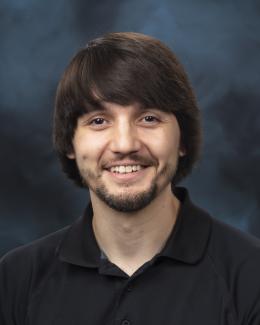
Bio
Michael J. Zachman joined ORNL as a Postdoctoral Research Associate in 2018 and transitioned to his current role as a Staff Scientist in 2019, working in the Materials MicroÅnalysis Group, Center for Nanophase Materials Sciences, Physical Sciences Directorate. Michael's research interests lie in advancing and applying electron microscopy techniques to study the structure and properties of energy materials and devices across multiple length scales. In particular, Michael has developed cryogenic focused ion beam (cryo-FIB) and analytical cryogenic scanning transmission electron microscopy (cryo-STEM) techniques for studying sensitive solid-liquid and hard-soft interfaces from devices in an intact state at high resolution. Michael has also worked to develop four-dimensional (4D)-STEM techniques to reveal new information about battery and catalyst materials down to the atomic scale and automation techniques to provide statistically relevant high-resolution information about systems such as hydrogen fuel cell/electrolyzer catalysts.
As part of his current research through ORNL's Early Career Laboratory Directed Research & Development (LDRD) program, Michael is continuing to develop and utilize cryogenic techniques to better understand processes at solid polymer electrolyte-electrode interfaces in Li-metal batteries. Michael is also a principal investigator in the Center for Ionomer-based Water Electrolysis (CIWE), an Energy Earthshot Research Center, where he is developing automated, low-dose cryogenic transmission electron microscopy (cryo-TEM) imaging methods to provide high-resolution structural information about hard-soft ionomer interfaces in hydrogen electrolyzers. Michael is also member of the Million Mile Fuel Cell Truck (M2FCT), Hydrogen from Next Generation Electrolyzers of Water (H2NEW), and Electrocatalysis (ElectroCat) consortia through the DOE's Hydrogen and Fuel Cell Technologies Office, where he utilizes a variety of electron microscopy techniques to advance hydrogen fuel cell and electrolyzer materials and devices.
In addition to his research, Michael is co-founder/leader of the Low-Temperature Electron Microscopy Focused Interest Group through the Microscopy Society of America. Prior to coming to ORNL, Michael received his B.S. in Physics from Purdue University in 2012 and his Ph.D. in Applied Physics from Cornell University in 2018.
Professional Experience
- 2023–present - R&D Staff, CNMS, ORNL
- 2019–2023 - R&D Associate, CNMS, ORNL
- 2018–2019 - Postdoctoral Research Associate, CNMS, ORNL
Awards
- Outstanding CNMS Staff Member Award, Center for Nanophase Materials Sciences, ORNL, 2023
- Distinguished Scientific Paper Award, Center for Nanophase Materials Sciences, ORNL, 2023
- Special Team Accomplishment Award ("For establishing first cryo-EM laboratory at ORNL/CNMS"), Center for Nanophase Materials Sciences, ORNL, 2023
- William Nichols Findley Award for Outstanding Research Paper, Cornell University School of Applied & Engineering Physics, 2019
- Early Career Representative and Scholarship for EMAS 2019, Microanalysis Society, 2019
- Best Microscopy and Microanalysis Journal Paper of 2016 Award, Microscopy Society of America, 2017
- Materials Handling Prize, Silent Hoist and Crane, 2017
- Meeting Scholarship, Enhanced Data Generated by Electrons, 2017
- Eric Samuel Scholarship Award, Microscopy Society of America, 2015
- Watt W. Webb Graduate Fellowship in Nanoscience, Kavli Institute at Cornell, 2014
Education
- 2018 - Cornell University, Ph.D., Applied Physics
- 2015 - Cornell University, M.S., Applied Physics
- 2012 - Purdue University, B.S., Physics

